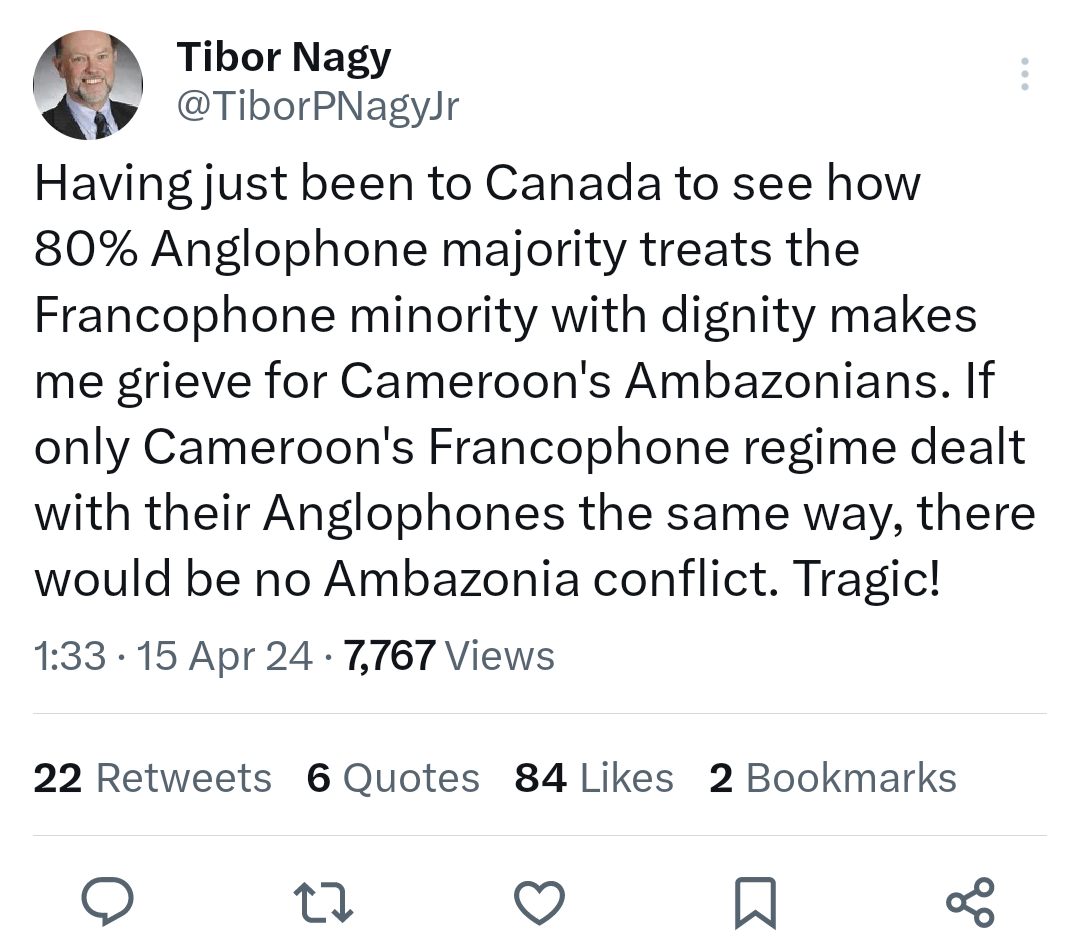Former United States Under Secretary of State for African Affairs, Tibor Nagy, has said the ongoing crisis in the English-speaking Regions could have been avoided if the government had learned from how Canada treats its minority French-speaking population.
In a post on X, formerly Twitter, Nagy lamented the failure of the Cameroon government to emulate Canada’s approach to minority rights.

His comments underscored the deep-seated grievances among Anglophones in Cameroon, who have long bemoaned marginalisation and discrimination by the Francophone-dominated government.
“Having just been to Canada to see how the 80% Anglophone majority treats the Francophone minority with dignity makes me grieve for Cameroon’s Ambazonians,” he tweeted on Monday, April 15.
“If only Cameroon’s Francophone regime dealt with their Anglophones the same way, there would be no Ambazonia conflict. Tragic!”
Nagy’s advocacy for Ambazonia’s separatist movement is not new.
Following his departure from the US government in 2020, he became a vocal supporter of Ambazonia, advocating for the creation of a breakaway state.
His stance has evolved over time, from advocating for a unified Cameroon to endorsing secession as the solution to the Anglophone crisis.
“We support a unified Cameroon because the last thing Africa needs is another minor state that will be full of poverty and suffering and need billions of dollars of foreign assistance. What happens if you split up part of Cameroon? What happens in parts of Nigeria? That’s not what Africa needs at all,” he stated in 2020 while still working for the US government.
However, Nagy’s shifting positions have drawn scrutiny and criticism.
His previous assertions before the US Congress emphasized the importance of dialogue, decentralization, and unity in resolving the conflict, contrasting with his later advocacy for secession.
“I think that most Cameroonians in the South West and North West have a sense of ‘Cameroonianess’ and they can’t accept to separate in what they call Ambazonia; in my view, it is not realistic,” he told Congress while responding to questions about whether Anglophones wanted a separation.
That reaction in 2019 was received with a lot of backlash from the Cameroon Anglophone Diaspora.
In 2021, when he was no longer in a position of power, his views changed.
Instead of pushing for genuine dialogue, Tibor Nagy became an advocate for secession as the only way out of the current predicament.
“If Southern Cameroonian leadership, their elites, and the people want to resolve their problem and achieve their full dignity, then they have to focus on the future instead of coming up with arguments that, ‘once upon a time, this happened. So it’s the responsibility of the international community to all of a sudden create the State of Ambazonia and give it to us’. That will be nice, but honestly, it’s not going to happen,” he said.
Nagy has been advocating for Southern Cameroonians to take their destiny into their own hands.
These are the same people he earlier said were in favour of unity with the Francophone majority.
Tibor Nagy had probably been to Canada before, but his recent visit suddenly reminded him of how the majority-Francophone regime in Cameroon should treat the Anglophone minority.
That is because Quebec, which consists of a minority of French-speaking Canadians, is treated with dignity and equality, contrary to the perceived treatment of the Anglophone minority in Cameroon.
Anglophones in Cameroon have accused the government of systematic discrimination and marginalisation since they reunited with the French-speaking majority in 1961.
This grievance triggered an industrial strike by Anglophone lawyers and teachers in 2016, which the general later joined.
The peaceful strikes in the Anglophone Regions were met with brutality from the government, leading to a bloody escalation in 2017.



